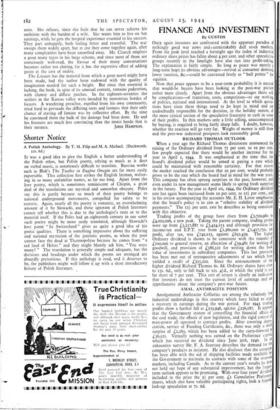Shorter Notice IT was a good idea to give the
English a better understanding of the Polish ethos, but Polish poetry, relying as much as it does on verbal music, is notoriously difficult to translate. Russian works such as Blok's The Twelve or Eugene Onegin are far more easily exportable. This collection first strikes the English layman, welter- ing in so many unfamiliar names, as far too long. Apart from the love poetry, which is sometimes reminiscent of Chopin, a great deal of the translations are mystical and somewhat obscure. Poles say this is partly because so much of their poetry belongs to national underground movements, compelled for safety to be esoteric. Again, nearly all the poetry is romantic, an overwhelming amount of it by Slowacki, and those ignorant of Polish literature cannot tell whether this is due to the anthologist's taste or to the material itself. If the Poles had an eighteenth century in our sense such poetry might be more easily translated, although Slowacki's. love poem "In Switzerland" gives us quite a good idea of his poetic qualities. There is something impressive about the suffering and national mysticism of the patriotic poems, as when the poet cannot face the dead at Thermopolyae because he comes from "a sad land of Helots" and they might bluntly ask him, "You were many?" The translation is generally simple and adequate, but the divisions and headings under which the poems are arranged are absurdly pretentious. If this anthology is read, and it deserves to be, the publishers might well follow it up with a short introductory history of Polish literature.


























 Previous page
Previous page